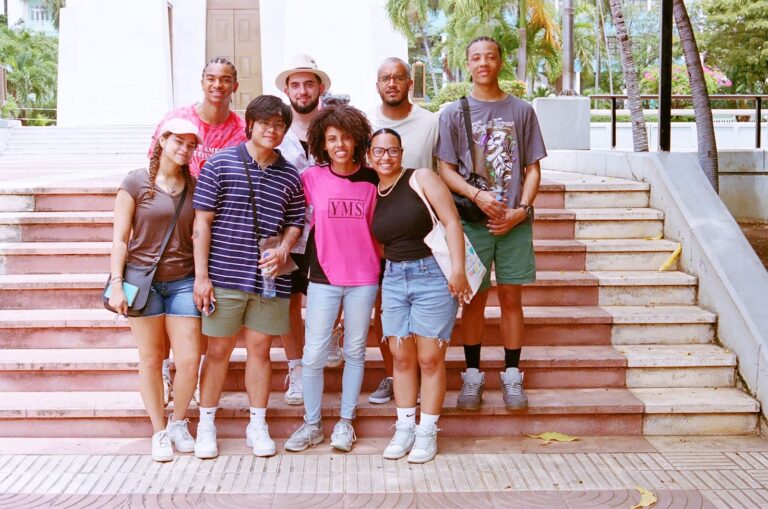Africana Research Collective Reflects on Summer Travel and Future Goals

Sometimes the best learning can happen outside of the classroom. In June 2022, Assistant Professor of African American Studies Garry Bertholf traveled to the Dominican Republic for two weeks with seven students involved in the Africana Research Collective, a group of first-generation low-income students of color who study the African diaspora.
The Collective, founded by Yohely Comprés ’24 and Gissel Ramirez ’24, explores the effects of colonialism in the Americas and considers the repercussions of race beyond the United States, through on-campus research and international travel. Other student members include Ethan Barrett ’24, Ayer Richmond ’24, Edmund Jurado ’24, Finn Kassell Osborne ’24, Lexie Allen ’24, and Ahmed Almohamed ’24.
“Our sense of the African diaspora is global in reach, including countries and geographies that have been erased or banalized within popular and academic understandings of the African diaspora,” reads the group’s description.
In the Dominican Republic, the Collective carried out ethnographic research and visited many sites integral to the slave trade and colonial history of the island, including traveling to ruins of different sugar plantations, mills, and marketplaces.
“We hope that this ethnographic research will serve as a bridge between our shared passions in this study, the coursework we engaged in over the past two years, and, at the root of these academic interests, our genealogies and lived experiences,” Ramirez said.
The students also crossed Santo Domingo to Dajabón, stopping to conduct research in several cities along the way, additionally conducting interviews with alumni from the Universidad Autónoma de Santo Domingo who identify as Afro-Dominican.
“As someone from the Dominican Republic who was majoring in Latin American Studies, I felt like Black Latin Americans were excluded from both AFAM and [Latin American Studies] (LAST), so I was interested in a space that filled that gap here at Wes,” Comprés said. “It’s important to think about the African Diaspora outside of the United States and that this needs to be understood from a non-Americanized framework of race, ethnicity and nationality. There is a lot of criticism faced by Dominicans who do not identify as Black, however, this sometimes is not an anti-Black sentiment but a sentiment of someone who is not thinking about race in the same ways that American scholarship does.”
Bertholf explained that when Ramirez and Comprés initially approached him with their idea, he was excited at the opportunity to create something new and try different approaches to researching this subject. The vision they ended up settling on was to “create an Africana that recruits,” per Ramirez.
The group did a great deal of fundraising and applying for grants in order to make their travel possible. The Gordon Career Center’s Summer Research Grants proved quite helpful, as did contributions from the Black Alumni Council. Ramirez elaborated on the importance of traveling to the Dominican Republic as part of the collective, even though she, herself, was unable to go.
“Traveling internationally and having the opportunity to conduct this ethnography will enable us to bring back to Wesleyan knowledge that would otherwise be forgotten or erased in our classrooms,” Ramirez said. “As FGLI/BIPOC+ students we have already experienced the erasure and banalization of African knowledge production outside of the Africana classroom. We are committed to bringing Caribbean Studies, Latin American Studies, and African American Studies together to grow Africana Studies at Wesleyan. We are interested in investigating how public universities abroad navigate important issues of equity and inclusion to build an anti-racist community.”
Other students in the Collective remain just as dedicated to its goals as the founders. Ahmed Almohamed ’24 is an AFAM major who took a class with Bertholf and joined the Collective at the encouragement of Ramirez and Comprés. Almohamed emphasized how powerful he found the experience of traveling to the Dominican Republican and studying historical sites there.
“One of the main things that stood out to me was a comparison in preservation between the sugar plantations, specifically Boca de Nigua, and Alcázar de Colón,” Almohamed said. “The castle of Columbus is preserved, heavily militarized, secured, and protected but the sugar plantation where the first slave rebellion took place is left in shambles, not protected, not preserved but rather neglected. Seeing these two sites in person and interacting with them gave me a new outlook on how one places themselves in the diaspora, and this is a topic I will continue to pursue throughout my academic journey.”
Comprés, too, elaborated on how transformative the trip ended up being for her.
“It is life-changing to see my native country this way and exchange information about the afterlife of slavery with the local people and the work we had done before our arrival to the DR,” Comprés said. “There was a lot of disappointment as a Dominican to see the different ways Dominicans self-identified to avoid their Blackness. When we visited the city of Dajabón, which is walking distance from the Dominican-Haitian border, a Dominican woman called Haitians ‘people with no culture’ because they acknowledge their Blackness. To have read about this denial is completely different than experiencing it and hearing it in person.”
Many of the students involved plan to continue their exploration of these subjects either in the form of a senior thesis or even studies post-graduation, in addition to their continued membership in the Collective, which will continue exploring the African Diaspora and offering students a space to research and reflect.
“Not only did I immerse myself in a completely different culture than my own, but I also got to experience the very things we discuss in classrooms at Wes,” Almohamed reiterated. “A lot of what I read for my classes presented itself right before my eyes, colonialism, the ‘white savior’ mentality, and the social hierarchy which arises from race and color.”
Richmond and Jurado wrote about their experiences for the Wes in the World blog.

